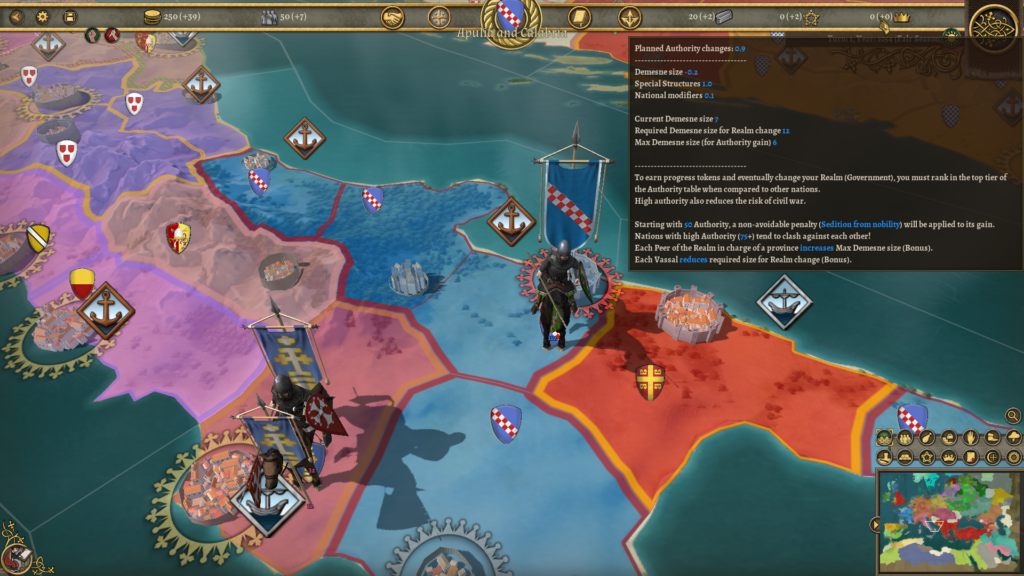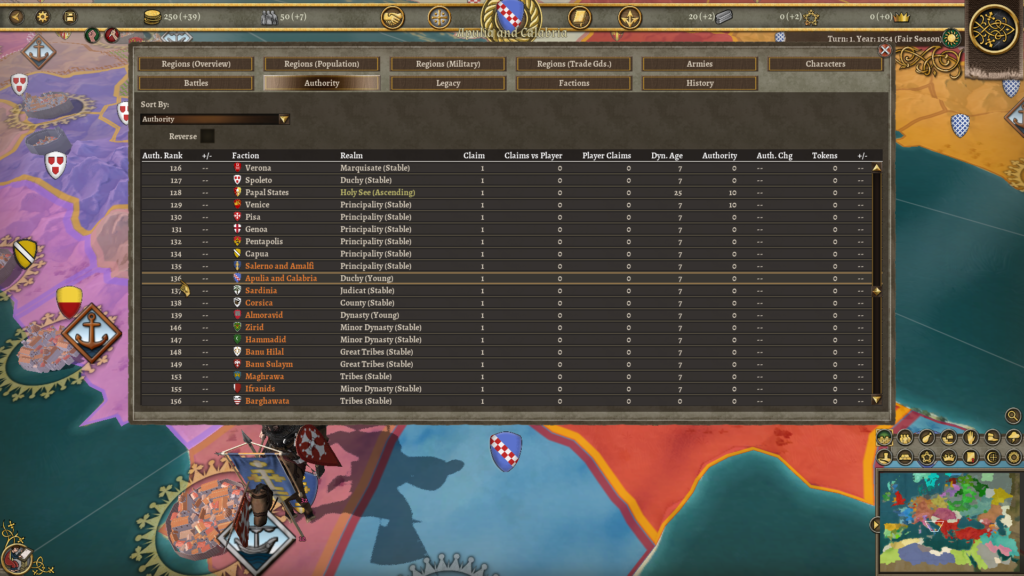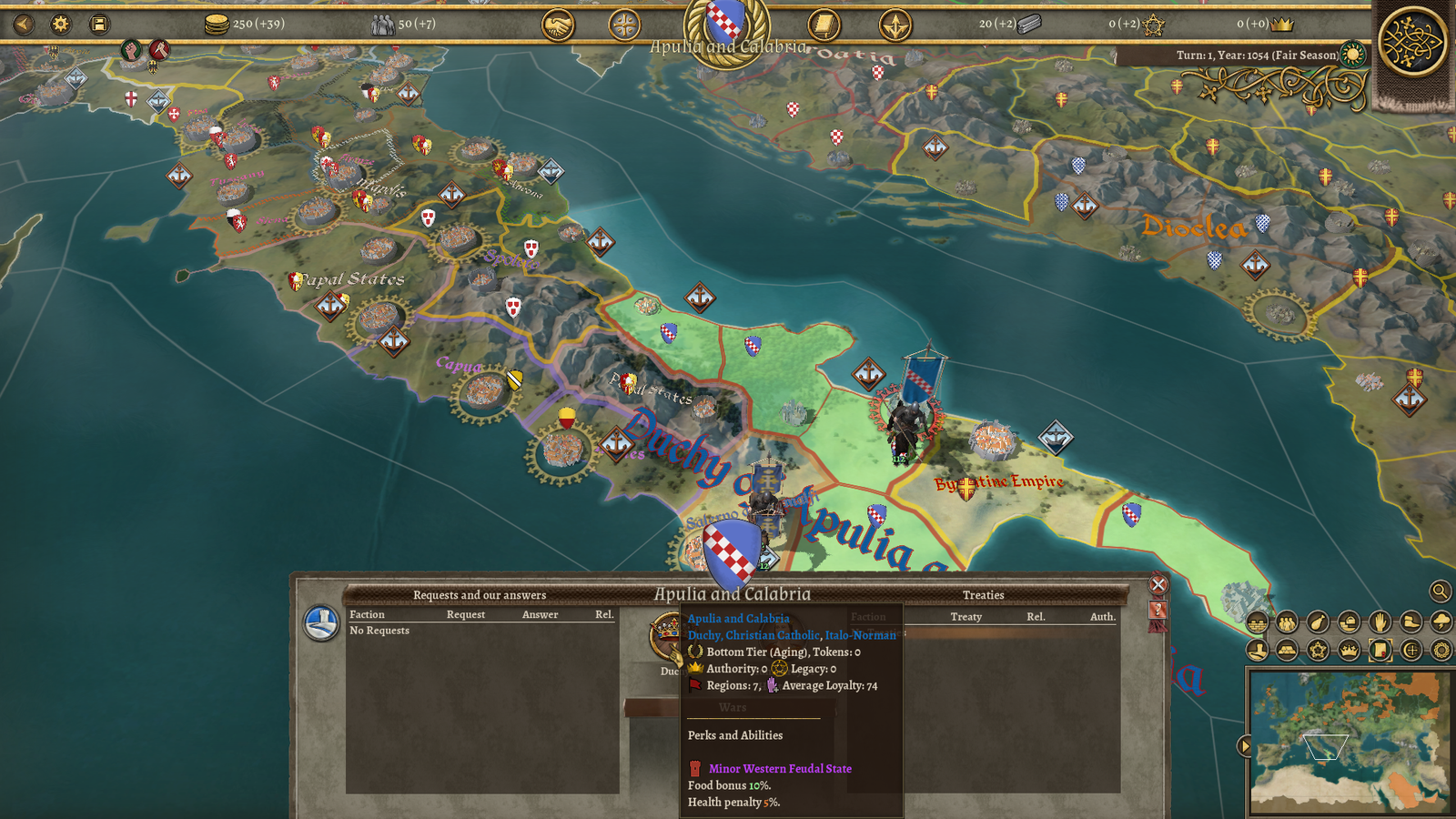By Arturo Mariano Iannace
Authority is a central concept in Field of Glory: Kingdoms. According to the game manual, Authority “represents the control the ruler has over his realm.” While the definition is fundamentally correct, it seems almost underwhelming compared to the relevance the concept plays in the game. In FoG: Kingdoms, Authority does not simply equate with ‘control’. It involves something akin to ‘glory’ when it is earned (or lost) due to the battles won (or to defeats); it comes closer to ‘reputation’ when it becomes the fundamental element of comparison between the player’s realm and its various opponents and neighbours. It is through this sort of ‘reputation’ mechanism (that is, via the comparison between the Authority enjoyed by the player’s realm and that enjoyed by the others) that a realm can progress (or regress) to different forms of governance, stabilizing and strengthening itself or stepping forward on the path to disgregation and collapse. It should be noted that Authority in FoG: Kingdoms is a ‘consensual’ asset: it does not rest on the brute use of force, but it implies the building of a consensus. As the manual puts it, after all, it also leads to a “grateful population”.
As such, Authority in FoG: Kingdoms could perhaps be re-defined as “the level of social and political legitimate power a ruler enjoys both inside and outside his realm”. This definition has a double advantage: it comes closer to existing definitions in Political Science and History (for example that proposed by Robert Dahl and reprised by Isabelle Duyvesteyn); and it emphasizes its exercise beyond the borders of the realm, making those same borders far less rigid and, thus, more akin to the medieval reality.
Once re-defined in this way, Authority also emerges as one of the most original and interesting concepts in FoG: Kingdoms, and an element of strength for the game compared to its competitors. For example, in Crusader Kings 3 players mainly control their realms via the Stewardship attribute, eventually combined with networks of interpersonal relationships, while diplomatic relations are managed through the Diplomacy attribute (and, therefore, almost completely disjointed from domestic issues).

As presented in FoG: Kingdoms, then, Authority is a powerful analytical tool. This becomes even more evident when taking into account its potential applications in the modellization of processes that, for lack of a better term, we will label ‘realm-building’.
A prime example is given by the Norman conquest of Southern Italy, a process in theory covered, chronologically speaking, by the Grand Campaign of FoG: Kingdoms, but otherwise completely neglected in the game. The Norman conquest of Southern Italy, differently from what happened almost concurrently in England, was a long, ‘anarchical’ process intertwining the ebbs and flows of the power of the Lombard principalities with the interests and goals of various warlords, which ultimately led to the consolidation of a unified Norman polity under the guise of the Kingdom of Sicily. Such a complex historical process finds in the concept of Authority a suitable key for representation: it is versatile enough to render the fluid dynamics of power between the Lombard principalities, the shifting of borders, and the processes of social and political disgregation and (re)consolidation that changed Southern Italy forever.

This is but a proposal, but it hints at how a key concept of FoG: Kingdoms could lead to an improvement of the game itself, while also serving as a powerful analytical tool for historians.
Bibliography
- E. Cuozzo, “Quei maledetti normanni”: cavalieri e organizzazione militare nel Mezzogiorno normanno, Napoli, 1989.
- R. Dahl, Modern Political Analysis, Englewood Cliffs, NJ, 1976.
- P. Delogu, ‘L’evoluzione politica dei Normanni d’Italia fra poteri locali e potestà universali’, in Atti del Congresso Internazionale di Studi sulla Sicilia Normanna (Palermo, 4-9 dicembre 1972), Palermo, 1973.
- I. Duyvesteyn, Clausewitz and African War. Politics and Strategy in Liberia and Somalia, London-New York, 2005.
- S. MacLean, Kingship and Politics in the Late Ninth Century. Charles the Fat and the End of the Carolingian Empire, Cambridge, 2003.
- Slitherine, Field of Glory: Kingdoms Manual.

Thanks for this Arturo! I really like this idea of authority working beyond the bounds of the realm. But I’m curious: do you think that the effect of this mechanic (presenting rulership as something that works beyond borders) is somewhat lessened by the fact that you spend a large part of the game staring at a map with clearly defined political boundaries? Is there any scope for the visuals of the game to support this mechanic more fully?
With the risk of derailing the discussion, I wonder if this doesn’t tie into what Stevan Anastasoff said, about minimalist game design being more adequate to portray certain historical ideas.
What would a historical strategy game without a modern UI and cartographical representations look like, I wonder? Something more like “Yes, Your Grace” than “Crusader Kings”, perhaps? (with the caveat that even YYG had a map)
That’s a very interesting implementation of a model of medieval authority in games! It reminds me of ‘febas’ (“excellency”), the attribute I created for “The Triumphs of Turlough” to model the political stability and renown of a ruler.
Adrian Hon has recently written that, even though games talk a lot about ‘agency’, what they mostly deliver is absolutist sovereignty: if not the power to dictate the fate of the game world, at least the certainty (or ‘relief’) to know that everything is ultimately in our hands: https://mssv.net/2025/05/30/beyond-agency/
Do you think the way authority has been operationalized in FoG offers a counterpoint to this trend? Or does it fall into familiar biases?
Thank you Vinicius! I’ll answer here to both questions/comments.
First of all, I believe a game with non-cartographic visuals could be something quite interesting to see in the field of grand strategy. It could also improve the players’ understanding of how geography, and thus space, were conceptualised and ‘lived’ by medieval rulers, which is something that, quite obviously, escapes us nowadays, used as we are to our own cartographic view of the world.
As for the second point, thank you for linking Hon’s essay, I didn’t know it. But I would definitely agree that grand strategy games tend to re-create a way of ruling that resembles absolutist sovereignty (or, better, the ideal of it, since its practice was quite complex too). Surely it is necessary to give agency to players, and this requires compromises, but I also believe that there is room for improvement here.
‘Authority’ in FoG is a good step forward, in my opinion. I don’t know whether I could call it a ‘counterpoint’ though, since it is still grounded on what you termed ‘familiar biases’. It’s a first step, but not yet the definitive one.
Thank you for your question Robert!
That’s an interesting point, and one that is inherently tied with the technical limitations of current grand strategy games. In my opinion, there could be ways to overcome this, for example by introducing some sort of ‘network-style’ visuals, but that’s really only just an idea. I believe Authority, as it is now in FoG, still works quite well despite the visual limitation, though surely it could be improved!
Thank you for your reflections, Arturo. It seems to me that more recent strategy games set in the Middle Ages have made an effort to simulate the particularities of medieval political systems better so that they do not end up recreating contemporary modern states such as CK3 and FoG. I wanted to ask if you could expand on the historical comparison you make with the conquest of Southern Italy and how would you relate it with the game’s emphasis on religious diversity and the impact that the ruler’s authority has on it.
Thank you for your reflections, Arturo. It seems to me that more recent strategy games set in the Middle Ages have made an effort to simulate the particularities of medieval political systems better so that they do not end up recreating contemporary modern states such as CK3 and FoG. I wanted to ask if you could expand on the historical comparison you make with the conquest of Southern Italy and how would you relate it with the game’s emphasis on religious diversity and the impact that the ruler’s authority has on it.
Thank you very much Juan! I totally agree that this is a sort of ‘new trend’, and personally I quite appreciate it.
Answering your question: the problem with using games for representing the Norman conquest of southern Italy is that it defies contemporary conceptions (and perceptions) of what constitutes a polity. It is nothing new, of course, there has been, and still there is, much historiographical debate concerning whether we could apply the label ‘State’ to medieval polities or not. However, the Norman conquest pushes all this to the forefront. The conquest itself was a patchy process: Norman knights began to arrive in the south, putting themselves into the service of the local Lombard princes or the Duchy of Naples and soon receiving the first lordships. And while they were building their powerbase this way (expanding their lordships; founding or receiving new ones; accepting more knights coming from the north) they also became players in the wider arena of southern politics. At that time, for example, the princes of Salerno (Guaimar IV and V) almost re-unified southern Italy under their rule, before receding back to their old borders due to various factors. What is important to note, is that the role and position of this knights (and also that of the various Lombard princes, more or less independent cities, and so on) is hard to categorize by representing them as fully independent, or linked through a relationship of vassallage. By applying the concept of Authority in FoG to this process, it could be easier to escape both temptations, and to model it as a web of different authorities vying to impose themselves upon the others, or simply to carve their space for greater autonomy. Since Authority in FoG is also links with the consolidation or the disgregation of a realm, it could really help in representing also the process of political disgregation which characterized the Lombard polities at the time (and which ultimately gave the Normans enough room for imposing themselves as new overlords).
I don’t know if I have been clear, please if you need more clarifications, just ask!